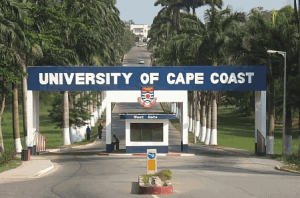UCC Vice Chancellor decries low students intake into sciences
 Professor Joseph Ghartey Ampiah, the Vice Chancellor of the University of Cape Coast (UCC), has expressed frustration over the institution’s low intake of students into the sciences due to students inability to meet the minimum entry requirement.
Professor Joseph Ghartey Ampiah, the Vice Chancellor of the University of Cape Coast (UCC), has expressed frustration over the institution’s low intake of students into the sciences due to students inability to meet the minimum entry requirement.
He mentioned the Department of Physics, Chemistry, Biology, and Agricultural Science as worst affected and revealed that the Institution formerly organized remedial classes to better the grades of students to shore up the enrolment but to no avail.
The Vice Chancellor this at the 60th anniversary and 31st Biennial Conference of the Ghana Science Association (GSA) in Cape Coast.
Prof. Ampiah partly blamed the situation on lack of innovative teaching methods of some science teachers and called on the members of the Ghana Association of Science Teachers (GAST), to effectively stimulate productive discussions and come up with more innovative methods of teaching science and technology subjects, to demystify the fears of students in learning the subject.
The Vice Chancellor also underlined the fact that the abysmal performance of students in pre-tertiary schools was due to lack of basic laboratory materials and equipment, which interfered with the ideal of teaching science using a hands-on approach.
Without proper practicals or demos, students would find it more challenging to understand topics taught in class, and noted that in many respects, some of the science teachers made the teaching of science so theoretical that one needed to be highly imaginative to be able to follow.
“In 2016, when students from Prempeh College won the International Robotics Awards (IRA), I was excited. That’s because, some teachers took it upon themselves to train these students in the practical aspect of science to gain this award,” he said.
The Vice Chancellor stated that Innovative ways of teaching and learning science and technology had been identified as the surest method that would help science education and reposition Ghana towards faster economic growth and sustained development.
Therefore, teachers must adopt modern pedagogies to push forward the frontiers of science and technology education in Ghana by producing the next generation of problem solvers who are not rote learners.
Mr. Yaw Osafo-Marfo, the Senior Minister who was the special guest reiterated government’s commitment to the teaching and learning of science and technology as central to the achievement of national development aspirations.
Mr. Osafo-Marfo assured that government would ensure that well-trained, confident and contented teachers are placed at the heart of delivery of quality education.
Professor Moses Jojo Eghan, President of GSA called for the implementation of policies geared towards the application of Science and Technology Innovations (STI) to be integrated into national development strategies.
Source: GNA
